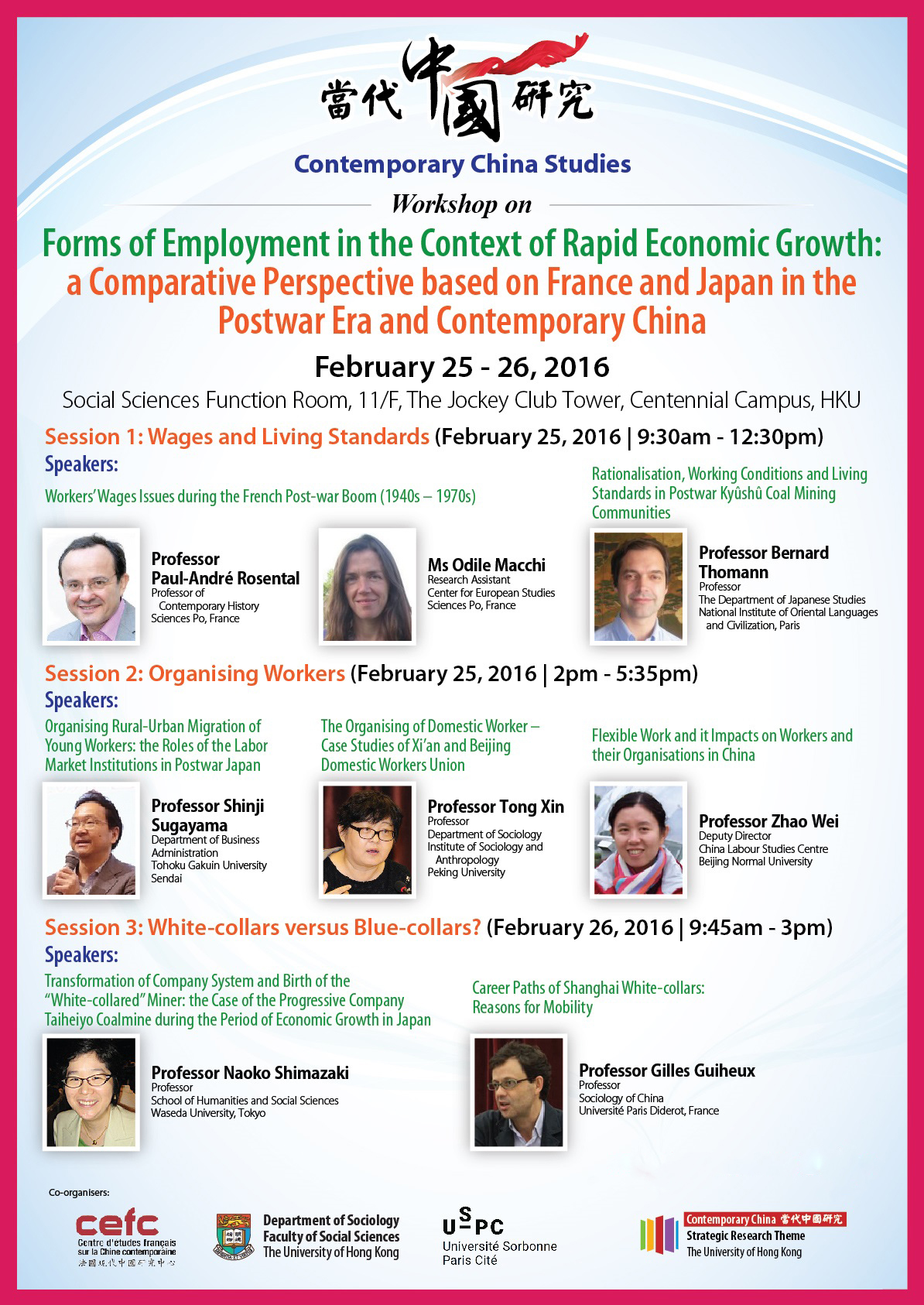Background
This is the second workshop after a first one that took place in Berlin at the IGK Work and Human Life Cycle in Global History Center (Humbolt University, Berlin, Germany) on June 19-20 2015. It is part of a research program jointly organized by Paul-André Rosental (Institut d’Etudes Politiques), Bernard Thomann (Institut National des Langues et Civilisations Orintales) and Gilles Guiheux (Université Paris Diderot) and funded by the University Sorbonne Paris Cité federation (USPC).
Main objective and contents
Bringing together historian and social scientist working on the China, Japan and France, we intend to demonstrate the benefits of a comparative approach. Our original comparative approach brings together different places – China, France, Japan – at different periods: the last thirty years in China, the 1950s to 1970s of high growth in Japan and France. We don’t intend to analyse the Chinese case in the light of the past experience of older industrialized nations like Japan and France taken as the norm. Looking at China, we are not trying to identify patterns of development familiar to us because of the experience followed by Japan or France in the past. On the contrary, we intend to make use of the present Chinese case to question the Japanese and French past. Looking at China “Thirty Glorious Years”, we would like to reflect on the high growth period that France and Japan went through after World War Two.
Our argument is to confront a largely diffused idea according to which, in old industrialized countries, first, high growth has been synonymous and was possible because a generalized standardization and securitization of the labour status and, second, we are now going through a radically new area, where growing social insecurity is replacing the almost universalized security. However, a quick review of the social changes associated with China’s rapid growth questions the universality of the Fordist dynamic. In today’s China, high growth coexists with various forms of employment. With this apparent paradox in mind, one can, in turn, asks the truly hegemonic nature of the process of normalization and securitization of the wage condition in oldest industrialized nations and provides a more nuanced analysis of the construction process of the middle-class, and more broadly, of the development of social citizenship.
Our argument is not to use a comparative approach to build a universal definition of labour precariousness. We are aiming at finding out how social actors, whatever labour market institutions and policies they are confronted to, use their agency, what kind of strategies they develop in a context of high growth, when rapid social changes move the established social hierarchies. In the three different contexts of France and Japan after World War II, and China along the last thirty years, governments and enterprises develop policies aiming at promoting social integration of working populations and, simultaneously, strengthening economic competitiveness. And, in this complex institutional context, individuals (and families) are trying to pursue to apparently contradictory goals : securing their life (through a stable job and a high level of social protections) and at the same time trying to size the opportunities offered by high economic growth (which may mean taking risks). We will look at how social actors balance their interest between pursuing security and taking risks.
SPEAKERS:
Eric Florence (CEFC Hong Kong)
Gilles Guiheux (University Paris Diderot, France)
Odile Macchi (Science Po Paris, France)
Paul-André Rosental (Sciences Po Paris, France)
Naoko Shimazaki (Waseda University, Tokyo)
Shinji Sugayama (Tohoku Gakuin University, Sendai)
Bernard Thomann (National Institute of Oriental Languages and Civilizations, Paris, France)
Tong Xin (Beijing University)
Zhao Wei (Beijing Normal University)
Schedule of Workshop, please click here
Session 1:
Wages and living standards
Date: 25 February 2016, 9:30am – 12:00 noon
Session 2:
Organizing workers
Date: 25 February 2016, 2:00pm – 5:00pm
Session 3:
White-collars versus Blue collars
Date: 26 February 2016, 9:45am – 5:00pm

ALL INTERESTED ARE WELCOME!
Conference will be held in ENGLISH
Free Admission
Reservation not required

